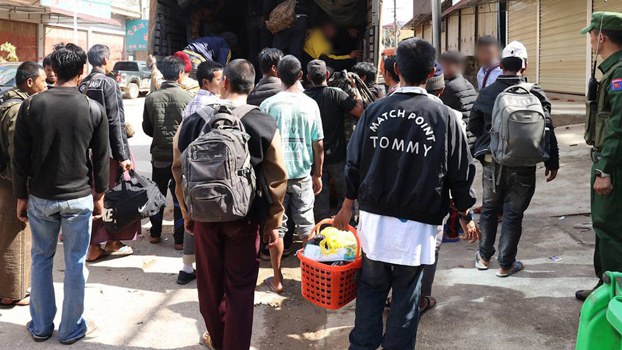Myanmar’s ethnic armed organizations and other resistance groups made significant gains against the country’s military dictatorship in 2023.
“Operation 1027,” launched by the Three Brotherhood Alliance in northern Shan state in October, was a surprising success. Along with the efforts of local People’s Defense Forces, or PDFs, and ethnic armed groups in Kayah, Kayin, Chin, and Kachin states, anti-junta forces put the ruling military junta on the defensive.
The junta lost hundreds of outposts as rebel forces captured towns and several key border crossings in November and December, suggesting the tide could be turning in the country’s civil war that erupted after the military overthrew a democratically elected government in a February 2021 coup d’etat
“The military council suffered great losses in 2023, while the people’s revolution has stepped forward gradually,” said Kyaw Zaw, spokesman for the shadow National Unity Government, or NUG. “It is the victory of the people.”
The number of junta troops surrendering to resistance forces increased after Operation 1027 began.

On Oct. 30, more than 40 members of Light Infantry Battalion 143 in Kunlong township, northern Shan state, surrendered to the Three Brotherhood Alliance, which includes the Arakan Army, Myanmar National Democratic Alliance Army and the Ta’ang National Liberation Army.
A day later, the military junta’s 15 local militia members laid down their weapons and turned over their arms and ammunition. Reports of junta units submitting to resistance forces have continued over the last two months.
“Many have contacted us to surrender,” said Maung Maung Swe, spokesman for the NUG’s Ministry of Defense. “If we can have more collaborative fights, the military council will soon topple.”
Junta troops have lost motivation and confidence in their fighting ability because of Operation 1027, political observer Than Soe Naing said.
“They have realized they should not sacrifice their lives for corrupt senior military officials,” he said. “They will surrender if they are defeated, and will flee from the military if they have an opportunity. It’s become a common idea among soldiers.”
We were unable to reach junta spokesman Maj. Gen. Zaw Min Tun for comment about junta forces surrendering.
Local administrations
Ethnic armies and officials from the NUG, which is mostly made up of former civilian government leaders, have been setting up interim administrative bodies in areas they control.
In other areas of the country, resistance leaders have started to think about what Myanmar would look like if the junta was defeated.
In Sagaing region, a hotbed of resistance to military rule that saw a resurgence of anti-junta protests in 2023, more than 170 resistance forces held a forum on May 30-31 to discuss the armed revolt and local administration.

“The forum was held to continue the revolution collaboratively as it has been for more than two years,” Sagaing Forum spokesman Chaw Su San said. “It also aims to forge more cooperation among anti-military dictatorship forces in Sagaing region.”
On Nov. 17, democratically elected representatives from Sagaing, Tanintharyi and Magway regions convened regional parliaments and approved a preparatory bill for an interim constitution, supported by the dissolved National League for Democracy.
But revolutionary groups objected to the measure, saying they wanted to ensure equal rights for negotiation, participation and collective leadership by all resistance groups, said Soe Win Swe, another Sagaing Forum spokesman.
“We concluded that the recent approval was intended just for the interest of a single organization, so we objected to it,” he said. “The Sagaing Forum firmly stands on collective leadership.”
Draft constitutions
In western Myanmar, armed ethnic Chin groups have also gone on the offensive since October.
“Our resistance forces could capture only four or five military outposts in the past two and half years,” said Salai Timmy, the secretary of the Chinland Joint Defense Committee.
“However, after launching Operation 1027, we controlled about nine outposts,” he said. “Meanwhile, the military troops abandoned about 12 camps.”
The Chin National Front, an ethnic Chin political organization whose armed wing has battled junta forces, along with local administration organizations, established Chinland — Chin state’s new name – following the approval of a new constitution on Dec. 6.
The Chinland Council, the new governing body, will form a legislature, an administration and a judiciary branch within 60 days, said Salai Htet Ni, first joint secretary of the council.

In eastern Myanmar, ethnic Karenni forces launched Operation 11.11 — their own version of Operation 1027 — in November, seizing at least nine military outposts in Kayah state, said Khun Bedu, chairman of the Karenni Nationalities Defense Force.
“The junta soldiers abandoned their camps,” he said. “We are moving on to capture more outposts.”
Resistance forces in Kayah state set up an Interim Executive Council, or IEC, on June 12, putting in place local administrations at village, village-tract and township levels, IEC General Secretary Khu Plue Reh said.
NUG is working with the IEC without intervening in administrative procedures, he said.
“We also work together to provide public services especially in education, health care and humanitarian assistance,” he said.
With its own public support, the establishment of the IEC could be an initial step toward the establishment of a federal union in Myanmar — a long-running goal of ethnic political organizations and their respective ethnic armies.
In adjacent Kayin state, the Karen National Union, or KNU, battled junta troops, while providing training to local PDFs.
The KNU’s Karen National Liberation Army and PDF forces took control of Mon township in early December — the first town captured in Bago region. Resistance forces controlled four other military outposts near the township after three military officers and 19 soldiers surrendered during the battles, according to a KNU news release on Dec. 6.
Ethnic Karen resistance groups announced that they would form a federal unit this year and would prepare a draft constitution, KNU spokesman Padho Saw Taw Nee said.



